McLaren have not scored a Grand Prix victory since 2012 - a long barren spell for a team with eight constructors’ championship trophies in their cabinet - and this season they have seen a driver stand on the podium just once.
So how are Ron Dennis’s plans to return his team to winning ways really progressing - and will those plans continue to involve Jenson Button and Kevin Magnussen? We spoke to the McLaren Group Chairman and CEO to find out…
Q: Belgium wasn’t a bad weekend for McLaren, all in all, on the basis that it confirmed the team’s gentle upward performance trend. But a gentle upward trend is hardly good enough for McLaren, is it? To put it bluntly, why are McLaren still not winning, and when will you start winning again?
Ron Dennis: The answer to the second part of your question is, of course, as soon as possible. But, realistically, improving Formula One teams’ competitiveness relative to their rivals has always taken time, and I expected the process we’re currently engaged in to take time too. You only have to look at recent historical statistics. Red Bull has enjoyed several years of success recently, but it took them five years to win their first world championship. During that period Adrian (Newey) joined the team - in 2006 - and it was still three years after that before they won a Grand Prix. Equally, Ferrari is one of the most successful teams in the history of Formula One, but when Jean (Todt) joined in 1993 it took six years and 102 Grands Prix before the team won its next world championship, ending a long barren spell. Finally, Mercedes-Benz is winning a lot of Grands Prix this year, and may well win the world championship too, but Brawn, the team acquired by Mercedes-Benz at the end of 2009, was already a world championship-winning team, having taken the title that year, and yet it took Mercedes-Benz 40 Grands Prix before they next won a race. So, as I say, turning a decent Formula One team into a winning Formula One team always takes time.
In fact, over the winter of 2013-14, as I was looking at the aero data I was being shown by McLaren’s designers and engineers, I already knew that 2014 was going to be another challenging season. But you have to think through changes meticulously before you make them. There are a few more core issues that I still want to address, and there are a few more talented individuals whom I still want to attract. That process usually carries with it the necessity to deal with notice periods, which normally manifest themselves in gardening leave, but, as you gradually assemble your team, what you’re doing is carefully putting together a complex jigsaw puzzle. As and when the final piece of that jigsaw puzzle is put in place, you begin to edge into a state of competitiveness and ultimately into a state of success. I’ve done it before. I know how it works.
So yes, we’ve caught up with our rivals to a certain degree - our grid positions at Spa and at other recent Grands Prix would appear to confirm that - but the lap-time differential between our cars and the most competitive cars is still significant. In fact, bridging the totality of that performance gap will be finally achieved only when we begin to enjoy the benefits of partnering with an engine manufacturer that’s focusing its efforts on McLaren and McLaren alone, and that’s going to be the case when we start racing with Honda next year.
Q: Yes, in terms of sheer speed, we saw at Spa that the two Mercedes cars were two whole seconds ahead of the third car on the grid - a Red Bull. A gap such as that would usually be the differential between the frontrunners and the midfield runners, but now it’s the differential between the frontrunners and the best of the rest…
RD: Yes, and that shows you what an incredibly good job Mercedes-Benz has done this year - but it’s not as abnormal as you might think. If you study the history of Formula One, you see that significant regulation changes often give rise to one team being dominant – and, of course, we at McLaren have enjoyed that sort of dominant margin over our competitors in the past ourselves. That’s what you strive for. That’s what we’re striving for now. As early as next year - as all the engine manufacturers improve their engine performance - things will begin to close up a little, and the racing will become closer.
Q: You’ve talked about McLaren attracting talented individuals, and you’ve talked about your putting together a complex jigsaw puzzle. Could you please talk us through the rationale behind your recent senior management reshuffle - Martin (Whitmarsh) out, Eric (Boullier) in? Is it paying off? Was it the right timing and the right people?
RD: First, I want to say something about Martin. For almost 25 years Martin has been a very longstanding friend - to me personally and to McLaren generally - and he’s still that. He and I worked extremely closely throughout that quarter-century, and during that period he was always very committed, always made a significant contribution, and always did a lot to help me shape the development of the McLaren Group. He was in a senior position for more than 100 McLaren Grand Prix victories, and he was team principal for 20 of those. Also, over the quarter century we worked together, the turnover of the McLaren Group has grown to more than £600 million per annum, and he was always very much a part of that incredible success story.
Having said all that, the structure that I’m now putting in place dictates that the responsibility that had previously been shouldered by the team principal alone is now being spread among a number of individuals. Hence, none of those individuals is our team principal; rather, a group of individuals have job titles such as chief operating officer, racing director, sporting director, technical director, engineering director, and so on. It takes time for any new structure to bed in, and, as I’ve already said, we won’t see the full benefit of our new structure until all the other pieces of the jigsaw puzzle have fallen into place. I’m not alone in making these changes - I consult my senior colleagues - but ultimately someone has to be responsible for the key decisions, and at McLaren that someone is me. All the key decisions that have been taken since January 16th 2014 have been mine, for which, of course, I take full responsibility.
Q: Eric is French - some might say very French. How is he fitting into an environment as quintessentially British as McLaren in Woking, Surrey?
RD: (laughs) Good question. I’ll answer it with a joke: Eric’s French-ness doesn’t often make itself too obvious. Seriously, though, above all Eric is a racer. He’s an incredibly hard worker too, and his role - racing director - allows him to focus completely on racing. He needn’t be distracted by non-racing matters at all, and that was an important pre-requisite of the way I specced his job description, the way I designed the Eric-shaped piece of the jigsaw puzzle. Finally, I should add that McLaren Racing employs people of more than 30 different nationalities, and the reason for that is that we recruit with skill set and mindset in mind, not with any other aspect of an individual’s identikit in mind.
Q: Are you satisfied with Jenson (Button) and Kevin (Magnussen)? You attracted a bit of media criticism a while ago when you said Jenson should ‘try harder’. Jenson played down the significance of your remark, saying that you’d probably said it in the heat of the moment. But you’re not known for being the kind of man who gets carried away by the heat of the moment…
RD: Anyone who has actually seen the TV interview in question will know that there was an element of humour in what I said. Having said that, did I also intend to give Jenson a bit of a wake-up call? Yes, I did. But I did it softly, not maliciously. Indeed, perhaps the efficacy of my strategy was confirmed by the fact that Jenson immediately reacted by achieving his best race result of the year.
Anyway, to tackle the specificity of your question, yes, I’m satisfied with both Jenson and Kevin. They’re both capable of winning Grands Prix in a competitive car - Jenson has proved that 15 times in his long Formula One career, and Kevin has already demonstrated abundant pace in his so-far-short Formula One career - but clearly we’re not giving them a competitive car at the moment. Nonetheless, despite that, I want them to give their best - and, at the same time, be responsible enough to appreciate that McLaren will always make efforts to hire the best drivers available. If such opportunities arise, we’ll appraise them; we always have and we always will. All great Formula One teams are the same in that regard. But we’re not in a position to do that at the moment.
Q: You say you’re not in a position to do that at the moment, but what McLaren decides to do next season appears to be the decisive factor in this season’s driver-market merry-go-round. Are you keen to hire a megastar driver - the likes of Fernando Alonso or Sebastian Vettel?
RD: As I say, we’ll always look to employ the best drivers available - but they have to be available, don’t they? Having said that, for the avoidance of doubt, Jenson and Kevin represent an excellent blend of capable experience and youthful promise, and we’re very happy with both of them. The fact that we’re keeping an eye on what a few other drivers are up to in no way contradicts that, because, as I say, if opportunities arise, we’ll appraise them - we always have and we always will.
Q: Isn’t it the case that any driver is in truth available - if you really want him enough, and you’re prepared to move mountains to get him?
RD: Well, that depends on whether you respect drivers’ contracts or not, and I do.
Q: Moving away from McLaren to more general subjects, there are quite a number of Formula One committees now, many of them established with a view to shaping the future of the sport. Are you interested in personally playing a hands-on role in the activities of any of those committees?
RD: My attitude to my personal participation in that kind of activity is different from what it was some years ago. At one time it was my view that, as a team principal of a major Formula One team it was my responsibility to push for improvements and to play a leading role in that push. Now McLaren’s structure is different, and reporting to me are a group of senior management figures who are interfacing with the FIA and FOM in various areas - sporting, technical, commercial, promotional - and I prefer to contribute when asked. I no longer have to do the pushing myself in other words - my people are doing the pushing for me, if you like, with my support at all times and my assistance when required or desired. Having said that, I’m firmly of the opinion that changes must be effected for the overall good of the sport, and not because one or more teams may be lobbying assiduously in an attempt to improve their competitiveness relative to their rivals.
Next Up
Related Articles
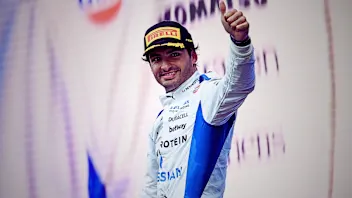 ExclusiveWhy Sainz feels ‘vindicated’ after his first Williams year
ExclusiveWhy Sainz feels ‘vindicated’ after his first Williams year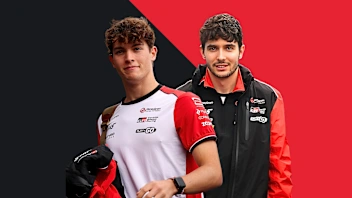 End Of Year Reports 2025Haas’ best and worst moments from 2025
End Of Year Reports 2025Haas’ best and worst moments from 2025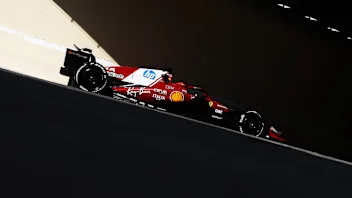 Ferrari confirm launch date for 2026 campaign
Ferrari confirm launch date for 2026 campaign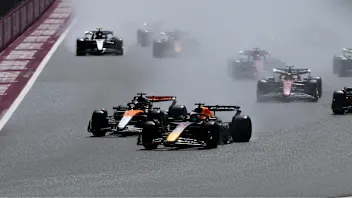 REVEALED: Your favourite race of the 2025 season
REVEALED: Your favourite race of the 2025 season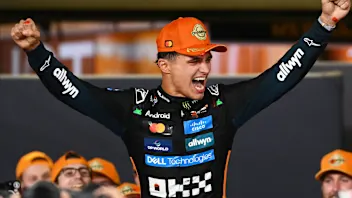 Our writers on the best drivers and stories from 2025
Our writers on the best drivers and stories from 2025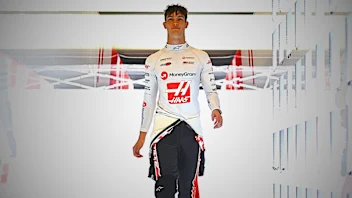 ExclusiveHow Bearman went from super-sub to star rookie in 2025
ExclusiveHow Bearman went from super-sub to star rookie in 2025